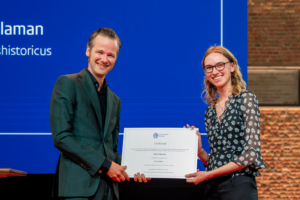Towards an inclusive university: In conversation with Pieter Slaman and Nour al Kuhaili
Applause. It is early September when everyone in the Pieterskerk listens intently to Nour Al Kuhaili and Pieter Slaman. During the opening of the academic year, they are respectively awarded the K.J. Cath prize and the LUS Teaching Award for their positive impact within the university.
Both student and professor share inspiring words but a short speech can't cover everything. What motivates them daily to work towards a diverse and inclusive learning environment? A month after the opening, both winners reflect on this question.
Space for personal attention
Anyone who gets the chance to talk to Nour and Pieter immediately recognises a vivid similarity: they each promote inclusivity by being curious and empathic. For the past five years, university historian Pieter Slaman has worked enthusiastically as lecturer in the History department. Hence why his student-based nomination comes to no surprise. "I still have jitters in my stomach when I think about it," he cheerfully recalls the honour. While teaching, he came into daily contact with a diverse student population. How does he go about this? "I try not lay everything out right away, I'm curious about what history means to them." Through tact and empathy he creates room for personal attention. He explains: "It's a matter of trial and error, some need a push while others need a sign to slow down. I do remain cautious. Some students experience struggles that make it difficult for them to take the stage. They shouldn't be forced."

What is particularly evident in Pieter's teaching strategy is that he thinks in possibilities. Is someone scared to present in front of the class? Then perhaps via Teams or from the comfort of their chair! And if there's a student who can't find representative material while conducting their research? Then that person is more than welcome to explore this in Pieter's classes. For example, a first-year student could find little on the history of queer women. Motivated by Pieter's encouraging words, she delved into her essay. "I'm going to do something about this," was her conviction.
Standing up for inclusive health care
Another person who was determined to take action, is medicine student Nour al Kuhaili. Now completing her third master, she has also gained experience outside of her studies which she gladly brings back to Leiden University. Crucial was her time at CODING - The Collective for Diversity and Inclusion in Dutch Medicine. Nour saw that there was still room for progress regarding D&I at LUMC and felt motivated to advocate for it. Not an easy step, she says, because when you start talking about diversity, people initially raise their eyebrows. Are you sure you want to start this, what if this outspokenness closes doors for you? But the pushback didn't stop Nour. It led to her mission: "How can we make our population of doctors a representative reflection of our multicultural society?" She explains the importance of inclusive health care: "Patients are more vulnerable when they see themselves reflected in you. This recognition does not only reside in appearance, as a doctor it is important that you can empathise with the person in front of you."

This also includes cultural sensitivity. "For example, does a patient want to hear their diagnosis? In some cultures it is customary to discuss this kind of information with a family member." Nour's empathy shines through again when she talks about her interest in lifestyle: "Sometimes a person wants to eat healthier but does not have the financial means." It is not an easy task to always take such context into account, however it is much needed. Nour's advice? "Stay curious! After all, with a diverse population of doctors, you can also approach your colleagues with these kinds of questions."
Call to join hands
Pieter and Nour's stories are a call to join hands within the university. Where some have to fight hard to raise D&I awareness, others can reach out and offer help by amplifying their voices. For example, Pieter admires Nour: "She puts herself out there as a woman with a migration background and simultaneously dedicates herself to one of the most challenging studies we have, I take my hat off to that."
All in all, with both staff and students promoting D&I in various areas, we continue to move forward as university.



0 Comments